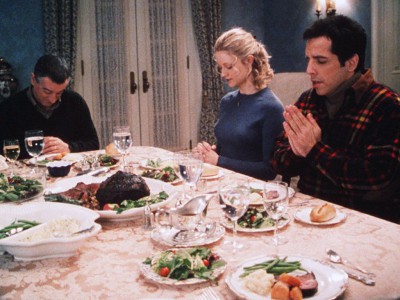
Photo: Dinner Series/Flickr
Readers: who remembers that first dinner with your boy/girlfriend’s parents? Who has hosted their own child’s sweetheart for dinner?
Family therapist Anne Fishel of The Family Dinner Project just did. She shares not only her original thoughts on the topic, but a postscript, too.
Anne Fishel
The Family Dinner Project
It’s hard to be our best, most authentic selves when our children bring a significant other home to dinner. As both generations wonder how they’re being sized up, it’s only natural that the meal feels a little tense and awkward. The parents may be fast-forwarding, wondering whether this interloper could one day be an in-law. The young guest may feel in the hot seat, while also questioning what he or she could be getting into if the relationship becomes a “forever” one.
When I first brought home my 20-year-old boyfriend, my usually stylish mother greeted us in her bathrobe, as if to say, if I dress casually, maybe I can pretend this isn’t such a big deal. She then holed up in the kitchen, sending out one burnt waffle after the other. Meanwhile, in the dining room, my father grilled my boyfriend about his career intentions, his previous job history and his left-of-left political leanings. I raced back and forth trying to do damage control. It was probably another decade before we had another meal together at my parents’ house.
And it didn’t go any better when I went to his house. He had instructed his mother that I didn’t eat red meat, but she interpreted that information to mean that she could serve veal, since pink isn’t red. I so wanted to make a good first impression that I dutifully ate an oversized portion, and then tried to be as quiet as a mouse as I threw up all night in their bathroom.
Many decades later, I’ve had lots of time to reflect on the do’s and don’ts of bringing new people into a family. There have been countless funny movies on the subject—from the tense Easter dinner scene in Annie Hall (where Woody Allen recoils from the dinner talk about boat basins and swap meets) to the hilarious dinner scene in Meet the Parents (where Ben Stiller talks about milking cats, then knocks down an urn of his fiancé’s grandmother’s ashes).

Cringe-worthy: dinner at the Fockers
As a family therapist, I’ve tried to help many families welcome a new member whose different background, values or food preferences may at first seem insurmountable. Here is some advice for that first family dinner when a child brings home his or her sweetheart.
What not to discuss:
- Private family matters. My friend Patty told me that when her boyfriend first came to dinner, her parents discussed their wills and funeral arrangements. Having a significant other for dinner may raise anxiety and thoughts about the future, but parents should keep this in check.
- Embarrassing childhood stories. No funny stories about potty training. At that first veal dinner, I asked my boyfriend’s mother what he had been like as a child. There was a very long pause, as though she were either censoring a whole set of compromising stories or because she was having trouble remembering her third child’s childhood. Finally, she said, “He was a good sleeper.”
- Making jokes at your child’s expense. Everyone feels the pressure of being sized up, so bringing more embarrassment to the table isn’t going to improve the meal.
- Former significant others. Parents should not ask if their son or daughter has heard anything from that lovely previous boyfriend or girlfriend or, even worse, make comparisons: “You know, you look a lot like Ben’s previous girlfriend, maybe a little rounder.”
- Questions you’d love to ask but are way too intimate, like “What do you love about my son/daughter? I wonder if it’s the same thing I love.”
- No grilling, unless we’re talking about the fish.
- Where-is-all-this-going questions. It’s probably best to stay away from asking whether Sara is planning to move in with your son.
In other words, best to stay away from the far past and the far future, and stick to topics in the present like:
- Involve your guest in some aspect of the dinner to minimize that feeling of being an outsider, of being scrutinized like a specimen. This might also be an opportunity to ask about their dinner rituals. What is your favorite part of family dinner?
- Gently ask curious questions about the significant other that indicate that you have heard and retained something about him or her. A parent might ask about what it was like to grow up on a sheep farm, or what it’s like to work in a bakery.
- Do ask your son or daughter if the guest has any food allergies, or food dislikes. There is no reason to risk throwing this person into anaphylactic shock or watching them stare at their plate while they push around food they hate.
- Preempt the awkwardness of the significant other sitting in a parent’s customary chair by guiding the guest to the desired seat.
- Do bring up topics of conversations or stories that are interesting to you. After all, this is a chance for your child’s sweetheart to start to get to know you.
There are many ways that your child’s guest may contribute to a happy meal, too. Bringing a small gift, like flowers or a bottle of wine, is a nice gesture. Such graciousness from a young guest is like catnip to parents. Even if the meatloaf is the driest thing you’ve ever tasted, it’s a good idea to compliment something about the food. And parents like to know that their son or daughter has told their significant other something positive about them. A question to a parent about a meaningful hobby or work activity can warm things up.
Despite my father’s cross-examination of my boyfriend and my boyfriend’s mother, almost poisoning me, we went on to marry and have many happy family dinners with our parents — and later with our children. Now, it’s our turn to host, and I’m a little nervous.
How did it go??
Anne: “My husband and I went into a frenzy of cleaning and cooking, and hosted a delicious, gracious dinner. From our point of view, it was flawless. But, who knows how she will blog about it years from now.”
Anne Fishel is an Associate Clinical Professor of Psychology at the Harvard Medical School and Director of Family and Couples Therapy at Massachusetts General Hospital.
Read Anne’s previous posts on PRK:
Context is Everything: The Where Of Family Dinners
Ethics, Civil Discourse and the Family Meal
Roll Reversal: Dinner with a Young Adult Son
Family Dinners
